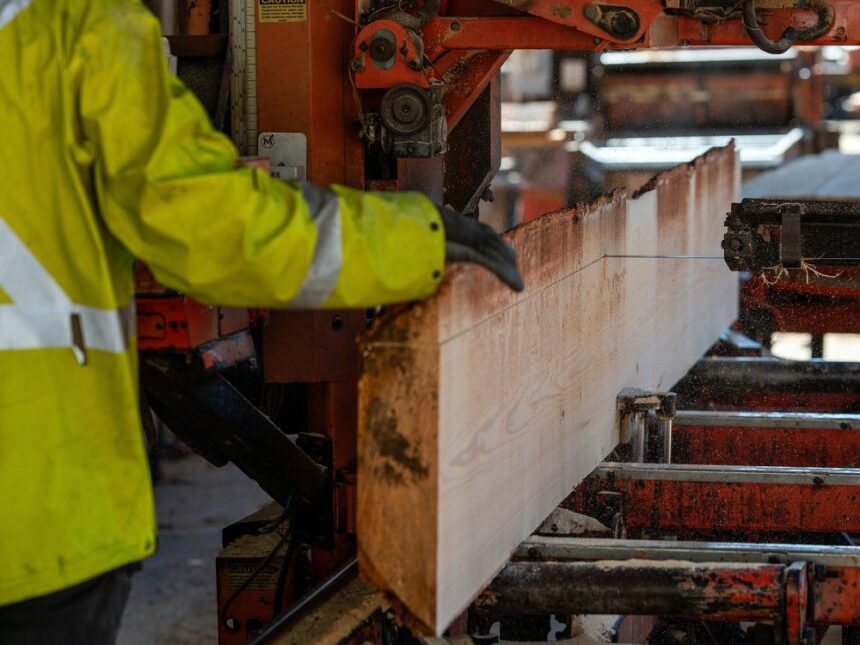Article – The quiet tension over wood beams and pine planks may soon spiral into a full-blown trade storm as the Trump administration signals a return to aggressive trade tactics against Canadian timber exports. After a four-year respite from the combative approach that characterized the previous Trump presidency, Canadian lumber producers are bracing for renewed conflict.
“We’re watching closely,” says Anne Mathieu, operations director at a Quebec-based lumber mill that employs 230 workers. “Last time, we had to lay off 40 people when the tariffs hit. We’re still recovering.”
The decades-long dispute centers on softwood lumber—the pine, spruce, and fir used in home construction across America. U.S. producers have long alleged that Canadian competitors benefit from unfair government subsidies because most Canadian timber comes from public lands, while American producers largely harvest from private property.
During my visit to mills in British Columbia last month, the anxiety was palpable. Stacks of lumber sat in yards as operators calculated how new tariffs might affect their bottom line. The industry directly employs about 95,000 Canadians, but supports nearly 300,000 jobs nationwide, according to Natural Resources Canada.
The previous Trump administration imposed duties averaging 20.23% on Canadian softwood lumber in 2017, part of an aggressive trade agenda that included renegotiating NAFTA. The Biden administration maintained these tariffs, but without the fiery rhetoric that accompanied them initially.
What’s different now is the housing crisis context. America faces a critical shortage of affordable homes, with the National Association of Home Builders estimating the country needs 1.5 million new housing units annually to meet demand. Higher lumber prices directly translate to more expensive homes.
“Each $1,000 increase in the price of a new home prices more than 153,000 households out of the market,” explains Michael Bourque, president of the Canadian Real Estate Association. “American homebuyers are the real victims here.”
U.S. Trade Representative Katherine Tai defended the existing tariffs last year, stating they protect American jobs from unfair competition. But internal documents obtained through Freedom of Information requests reveal disagreement within the Commerce Department about the actual impact of Canadian imports on U.S. producers.
The U.S. housing industry has consistently opposed these tariffs. “We need more lumber, not less,” says James Henderson, a construction company owner I interviewed in Maryland. “My costs went up about 15% during the last trade fight. I had to pass that on to homebuyers.”
The conflict runs deeper than economics—it reflects fundamentally different approaches to resource management. In Canada, about 94% of forestland is publicly owned, while in the U.S., most commercial timberland is privately held. This structural difference has fueled accusations of subsidization that Canada vehemently disputes.
At a lumber yard outside Ottawa, I watched workers loading trucks bound for American builders. “These boards will cost American families more money for no good reason,” said the yard manager, pointing to stacks of dimensional lumber. “All because of politics.”
The World Trade Organization has repeatedly ruled in Canada’s favor on key aspects of this dispute, but the U.S. has largely ignored these rulings, highlighting the limitations of international trade governance.
Canadian officials have begun diplomatic preparations for renewed conflict. “We’ve been here before,” says a senior Canadian trade official who requested anonymity to speak freely. “We’ve won at the WTO, we’ve won through NAFTA panels. The facts are on our side, but facts don’t always matter in trade politics.”
For communities dependent on the forestry sector, particularly in British Columbia, Quebec, and New Brunswick, the stakes couldn’t be higher. In places like Chetwynd, B.C., where I spent time reporting on the previous lumber dispute, the local economy revolves around timber production.
“When the mill slows down, the whole town feels it,” explains Mayor Allen Courtoreille. “The restaurants empty out, the shops struggle. We can’t diversify overnight.”
Economic analysis from the C.D. Howe Institute suggests that renewed tariffs could cost Canada approximately 9,000 jobs directly and reduce GDP by about $2.6 billion annually.
Meanwhile, U.S. construction firms report that they simply cannot source enough lumber domestically. “American producers don’t have the capacity to meet our needs,” explains Robert Dietz, chief economist for the National Association of Home Builders. “Restricting Canadian imports just drives up costs.”
As both countries prepare for potential escalation, the broader relationship hangs in the balance. Beyond lumber, interconnected supply chains in automotive manufacturing, energy, and agriculture could face disruption if tensions spiral.
For now, mills on both sides of the border continue production while watching political developments closely. The boards and beams they produce will frame homes, support structures, and—inadvertently—test the foundation of North American trade relations once again.






